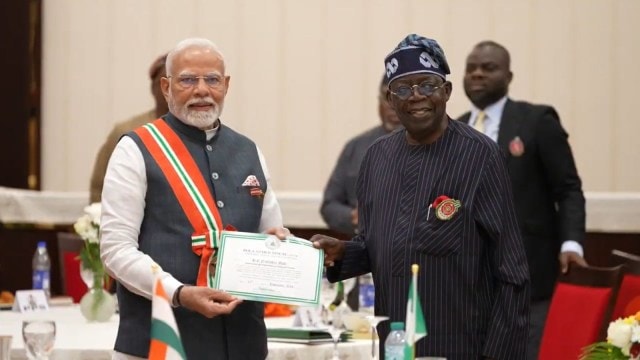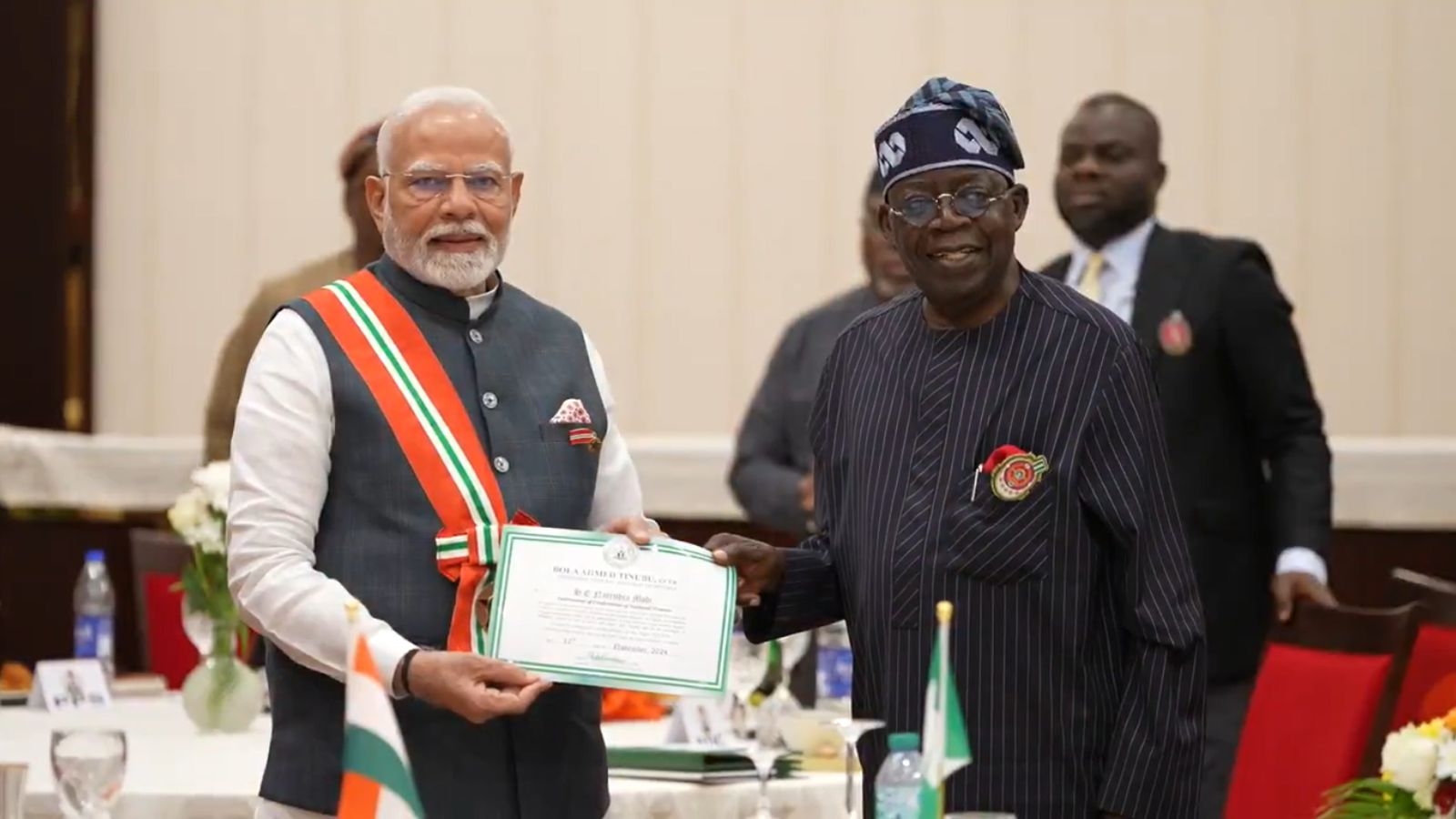

A R Ghanashyam
Nov 20, 2024 04:20 IST First published on: Nov 20, 2024 at 04:20 IST
Prime Minister Narendra Modi visited the Federal Republic of Nigeria on November 16-17. The last visit of an Indian PM to Nigeria was of Manmohan Singh in 2007. Before that, Atal Bihari Vajpayee visited the country in 2003. The first ever Indian Prime Ministerial visit to the country was by Jawaharlal Nehru in 1962. Between 1983 and 2023, India has hosted seven Nigerian presidents.
PM Modi had a meeting with President Bola Ahmed Tinubu followed by a delegation level meeting. He addressed and interacted with the Indian community in the capital. Three Memorandums of Understanding were inked during the visit. A highlight of the visit was the decoration of PM Modi with the national award of Nigeria, the Grand Commander of the Order of Niger. The only other awardee of the honour is Late Queen Elizabeth.
The first ever high-level interaction of the two countries after Nigeria became independent was in 1962 between Jawaharlal Nehru and Abubakar Tafawa Balewa in Lagos. When Nehru enquired in what way the two countries can cooperate for mutual benefit, Tafava Baleva conveyed, “Nigeria is a two-year-old toddler nation and India is 15 years old adolescent with wisdom and experience. There is a big population in Nigeria which needs health care. It has many patients but no doctors and hospitals. There is a large young population which must be educated but no schools and teachers. Roads and bridges must be built and railways need to be set up, but there are no managers and engineers. We have a government to run but no trained civil servants.” Nehru responded with a smile, saying, “you mean Nigeria needs practically everything.” On Nehru’s return, the Indian government put together a team to assist Nigeria. By the late Sixties, there were tens of thousands of Indian experts stationed in different parts of Nigeria.
When I presented my credentials as the new High Commissioner of India to then Nigerian President Goodluck Ebele Jonathan in 2014, he said, “High Commissioner, an entire generation of Nigerians were taught by Indian teachers, treated by Indian doctors and they grew up wearing Indian apparel and watching Indian movies. And I must tell you wherever you go in Nigeria you will find that your country has enormous goodwill.” I did travel the length and breadth of Nigeria in my tenure in Abuja and found the president’s statement to be an undeniable truth.
Nigeria, with 233 million inhabitants today, accounts for 16 per cent of Africa’s population. With a median age of 19.3 years, the country has a big responsibility in ensuring health and education services and employment opportunities for its youth. Nigeria feels India can be a great partner in this endeavour. For many years, Nigeria was the largest trading partner of India in Africa. Trade has declined in recent years because India may have replaced some Nigerian sweet crude oil with cheaper Russian oil. There are 200-odd Indian companies in Nigeria which employ the second largest industrial labour force in the country, next only to the federal and state governments. The Indian investment in Nigeria is valued at $27 billion. There is scope for more.
When Nigeria attained its independence, the UK and France both were keen to set up Nigeria’s military training institutions. Nigerian leaders however opted for India, and it was the Indian Army that established the National Defence Academy in Kaduna in 1964. Indian instructors stayed on in Kaduna for close to two decades at the request of Nigeria. Nigerian instructors started taking over from Indian instructors towards the end of the 1970s.
There are about 27,500 Nigerians trained in India, about half of them in military institutions. These are our permanent envoys in the country. Two Nigerian trainees from Defence Services Staff College (DSSC) in Wellington, India — Olusegun Obasanjo and Muhammadu Buhari — were both at the helm of affairs of Nigeria as military rulers and as democratically elected presidents. India offers 250 civilian and 250 defence slots under the Indian Technical and Economic Cooperation Programme (ITEC) every year.
India is the top destination for medical care for Nigerians. The country is attractive because of competent doctors, many well-endowed hospitals and affordable fees. With recently restored air travel services between the two countries, logistics has also improved. There is vast potential for Nigeria-India cooperation. Hopefully the new MoUs signed during PM Modi’s visit will help move in that direction.
Nigeria has the fourth largest standing army in Africa. But premier defence institutions in India like the National Defence College, New Delhi and the DSSC in Wellington give one seat each per country annually; Nigeria also gets one seat. This must be increased. Nigeria has been engaged in fighting the Boko Haram insurgency for nearly two decades and it believes that India can be the ideal partner to guide it. Nigerians have also shown interest in Indian military equipment. These opportunities are worth taking a serious look at.
It makes sense for Indian companies to set up hospitals and wellness centres in Nigeria so that only the serious patients who need surgical interventions need to be referred here. There are also opportunities in education.
To further improve trade and investment, it would be useful if an India-Nigeria Business Council is formed between the top four or five business houses from each country to explore avenues of mutually beneficial cooperation.
The writer is former High Commissioner of India to the Federal Republic of Nigeria


